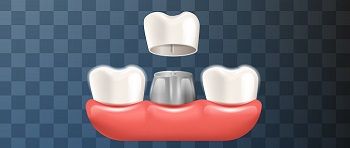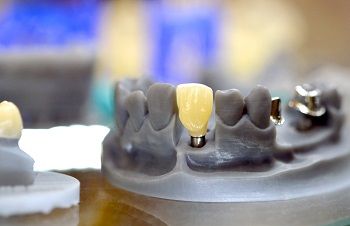Smile Makeovers: Transforming your Teeth with Dental Crowns
Dental Implants Solutions
Dental crowns are essential to cosmetic dentistry, providing a blend of form and function to address dental imperfections. They come in different materials and can transform a person's appearance. Dental crowns are not just about aesthetics but also serve as key players in cases where multiple dental concerns require simultaneous correction.
Understanding Dental Crowns
Dental crowns, often called "caps," are versatile dental restorations for functional and aesthetic purposes. These custom-made covers encase damaged or compromised teeth, restoring their strength, shape, and appearance. Crafted from porcelain, ceramic, or metals, they blend with natural teeth. Dental crowns address chipped, discolored, or misshapen teeth, offering durability and longevity. Patients can choose from all ceramic, porcelain-fused-to-metal, and metal crowns based on their preferences and needs. These crowns play a pivotal role in cosmetic dentistry, enhancing smiles and boosting self-confidence while preserving as much of the original tooth structure as possible.
Cosmetic Dentistry and Dental Crowns
In cosmetic dentistry, dental crowns shine as a cornerstone for smile enhancement. Seamlessly merging functionality and aesthetics, they are indispensable tools for smile makeovers. Dental crowns are versatile solutions for various issues, from discoloration to misalignment. These crowns are pivotal in cases where multiple cosmetic problems need correction, ensuring a harmonious result. By meticulously matching color, shape, and size, dental crowns offer natural-looking transformations. Collaborating with skilled dentists provides precise analysis and treatment planning, guaranteeing optimal outcomes. With a focus on restoring not only the aesthetics but also the confidence of patients, dental crowns stand as a testament to the profound impact of modern cosmetic dentistry.

Benefits of Dental Crowns in Cosmetic Dentistry
- Enhanced Aesthetics: Dental crowns are custom-made to match natural teeth' color, shape, and size. They can effectively cover teeth that are discolored, stained, misshapen, or have large fillings, improving the smile's overall appearance.
- Natural Look: Modern dental crowns are crafted from materials such as porcelain, ceramic, or zirconia, which closely resemble the appearance of natural teeth. This makes them virtually indistinguishable from the surrounding teeth, resulting in a seamless and natural look.
- Improved Tooth Shape and Alignment: Dental crowns can help correct the shape, size, and alignment of teeth, addressing issues such as teeth that are chipped, worn down, or unevenly spaced. They can provide a more harmonious and balanced smile.
- Strengthening Weak Teeth: Dental crowns are often used to provide protection and support to teeth that are weak, cracked, or structurally compromised. By covering the tooth entirely, a crown can restore its strength and prevent further damage.
- Longevity: High-quality dental crowns are durable and can last many years with proper care and maintenance. This longevity makes them a cost-effective solution for enhancing teeth' appearance and functionality.
- Protection for Damaged Teeth: Teeth undergoing significant dental work, such as root canals, may become more vulnerable to fractures and further damage. Placing a crown over a treated tooth can help protect it from breakage and ensure its longevity.
- Restoration of Functionality: In addition to cosmetic benefits, dental crowns restore the function of teeth. A crown can provide the necessary structure and stability for chewing and speaking if a tooth is severely decayed or damaged.
- Customizable: Dental crowns can be customized in color, shape, and size to match the patient's preferences and facial features. This personalization ensures the result is tailored to the individual's needs and desires.
- Minimized Sensitivity: Dental crowns can help reduce sensitivity caused by exposed tooth roots or cracks. The crown covers sensitive areas and can alleviate discomfort associated with hot or cold temperatures.
- Simple Procedure: Getting a dental crown typically involves a straightforward procedure that can often be completed in just a few dental appointments. The process usually includes tooth preparation, impression-taking, crown fabrication, and final placement.
The Dental Crown Procedure
The dental crown procedure is meticulously orchestrated and involves several key steps. It begins with an initial consultation and assessment, during which the dentist evaluates the tooth's condition and discusses treatment options. Tooth preparation follows, where the tooth is reshaped to accommodate the crown. Impressions are taken to create an accurate mold for crafting the crown. Dentists place a temporary crown to protect the prepared tooth. Skilled technicians in a dental lab meticulously design the crown to match the patient's natural teeth in color, shape, and size. Once ready, the final crown is affixed. This procedure offers a transformative solution, blending seamlessly with the patient's smile and oral functionality.
Choosing the Right Dental Crown
Choosing the right dental crown involves considering various factors, such as your specific dental needs, budget, aesthetic preferences, and your dentist's recommendations. Here are some essential factors to consider when selecting the right dental crown:
Material Choice
- Porcelain/Ceramic Crowns: These crowns closely mimic the natural appearance of teeth and are a popular choice for front teeth. They are suitable for individuals seeking highly aesthetic results.
- Porcelain Fused to Metal (PFM) Crowns: These crowns have a metal substructure for strength and a porcelain exterior for aesthetics. They offer a balance between durability and appearance.
- All-Metal Crowns: These are often made from materials like gold or other non-precious metals. They are highly durable and suitable for back teeth, but their metallic appearance may not be preferred for visible front teeth.

Aesthetics
- Choose a crown material that matches your natural teeth' color, translucency, and texture, especially if the crown will be visible when you smile.
- Discuss with your dentist about achieving the desired aesthetics; they can help you choose the most suitable material.
Durability and Functionality
- Consider the location of the tooth that needs a crown. Back teeth endure more biting force, so a more durable material like PFM or all-metal might be recommended.
- Porcelain or ceramic crowns may be more appropriate for front teeth due to their natural appearance.
Longevity
- Different crown materials have varying lifespans. All-metal crowns are the most durable, while all-ceramic crowns have slightly shorter lifespans. Discuss the expected lifespan with your dentist.
Cost
- Crown costs can vary based on material and complexity. All-metal crowns are often more affordable than all-ceramic or porcelain-fused-to-metal crowns.
- Consider your budget and insurance coverage when making your choice.
Dentist's Recommendation
- Your dentist's expertise is invaluable in making the right choice. They will consider your oral health, specific tooth conditions, and experience with different materials.
Allergies or Sensitivities
- If you have allergies to certain metals, you should inform your dentist. They can help choose materials that won't cause adverse reactions.
Caring for Dental Crowns
Maintain Good Oral Hygiene
- Brush your teeth at least twice a day using fluoride toothpaste. Pay extra attention to the gumline where the crown meets the natural tooth to prevent plaque buildup.
- Use a soft-bristled toothbrush to avoid scratching or damaging the crown's surface.
Floss Regularly
- Floss daily to remove food particles and plaque between your teeth, including around the crown. Use caution when flossing near the crown edges to avoid dislodging it.
Avoid Sticky or Hard Foods
- Be cautious when eating sticky or hard foods, as they can potentially cause damage to the crown or the underlying tooth. This is particularly important for crowns on molars and premolars.
Limit Staining Substances
- While crowns resist staining, excessive consumption of highly pigmented foods and beverages (such as coffee, tea, red wine, and berries) can still lead to discoloration over time. Rinse your mouth or brush your teeth after consuming such substances.
Regular Dental Checkups
- Maintain your regular dental checkup schedule. Your dentist will examine your crowns, clean them professionally, and address any issues promptly.
Avoid Using Teeth as Tools
- Refrain from using your teeth to open packages, tear off tags, or perform other tasks that could damage the crown.
Professional Cleanings
- Visit your dentist for professional cleanings to ensure your crowns and natural teeth remain free from plaque and tartar buildup.
Follow Post-Operative Instructions
- If you've recently had a crown placed, follow any post-operative instructions from your dentist. This might include guidelines for eating, cleaning, and caring for the crown during the initial healing period.
Potential Risks and Considerations
Here are some potential risks and considerations associated with dental crowns:
- Allergic Reactions: Let your dentist know if you have any allergies or sensitivities to crown materials, like metals in metal-based crowns.
- Tooth Sensitivity: Some people may feel sensitive to hot or cold drinks and food after a dental crown. Let your dentist know if it continues.
- Discomfort or Pain: Discomfort or pain after crown placement may occur but should be temporary. Consult your dentist if it persists.
- Chipped or Fractured Crown: To prevent damage to dental crowns, avoid biting down on hard objects.
- Gum Irritation or Inflammation: Improper crown placement can cause gum inflammation.
- Decay Under the Crown: Maintain good oral hygiene to prevent cavities in the tooth structure beneath the crown. Brush, floss, and see your dentist regularly.
Talk to your dentist about concerns and questions regarding dental crowns. They can provide personalized guidance and information to help you make an informed decision.
Cost and Investment
The cost of dental crowns depends on factors such as material choice, complexity of the case, and location. While dental crowns might entail an upfront investment, their long-term benefits make them valuable. These benefits include improved aesthetics, functionality, and confidence, along with potential savings from preventing further dental issues. Consulting with a dentist about payment options and dental insurance coverage can aid in managing the financial aspect.
Conclusion
Dental crowns improve both the look and function of teeth, boosting confidence. They're durable and minimally invasive, with long-lasting benefits. Moreover, collaborating with a skilled dentist ensures personalized treatment and optimal results. Therefore, investing in dental crowns is worth it for a revitalized smile that enhances overall well-being.
Contact your Walnut Creek Implant dentist, Massood Darvishzadeh, DDS at Dental Implant Solutions, to learn about Smile Makeovers: Transforming your Teeth with Dental Crowns.
Resource:
What causes pain in a tooth that has a crown?
*This media/content or any other on this website does not prescribe, recommend, or prevent any treatment or procedure. Therefore, we highly recommend that you get the advice of a qualified dentist or other medical practitioners regarding your specific dental condition.*
Subscribe To Our Newsletter
Get Updates And Learn From The Best
More To Explore



CONTACT US
Massood Darvishzadeh, DDS
2021 Mt Diablo Blvd., Suite 100A
Walnut Creek, CA 94596
(925) 939-2600info@dentalimplantsolutions.net